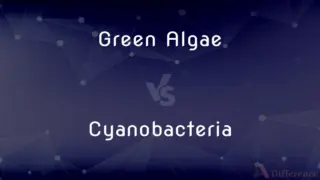Heterosis vs. Inbreeding Depression — What's the Difference?
By Tayyaba Rehman — Published on January 13, 2024
Heterosis, or hybrid vigor, refers to the increased strength or efficiency in hybrid offspring, while inbreeding depression is the reduced biological fitness in a population due to inbreeding.

Difference Between Heterosis and Inbreeding Depression
Table of Contents
ADVERTISEMENT
Key Differences
Heterosis manifests as enhanced growth, fertility, or survival in hybrid offspring, resulting from crossbreeding genetically diverse parents. In contrast, inbreeding depression leads to a decline in these traits due to mating between closely related individuals.
Heterosis often results in offspring with superior qualities compared to their parents, as it combines diverse genetic traits. Inbreeding depression, however, causes a decrease in genetic diversity, leading to weaker or less fit offspring.
Heterosis is exploited in agriculture to produce crops or livestock with improved traits. Inbreeding depression is a significant concern in small, isolated populations, where it can lead to an accumulation of deleterious traits.
Heterosis can result in increased disease resistance and adaptability in hybrids. In contrast, inbreeding depression often leads to an increased susceptibility to diseases and environmental stresses.
The benefits of heterosis are maximized through careful selective breeding practices. Inbreeding depression can be mitigated by introducing genetic diversity into the breeding pool.
ADVERTISEMENT
Comparison Chart
Genetic Diversity
Results from high genetic diversity.
Results from low genetic diversity.
Biological Fitness
Increased strength, fertility, and survival.
Decreased strength, fertility, and survival.
Common Use
Widely used in agriculture and animal breeding.
Often a challenge in conservation and small populations.
Disease Resistance
Increased resistance to diseases.
Increased susceptibility to diseases.
Outcome
Enhanced qualities compared to parents.
Diminished qualities compared to parents.
Compare with Definitions
Heterosis
Heterosis is the improved or increased function of any biological quality in a hybrid offspring.
Corn hybrids exhibit heterosis, often resulting in higher yields.
Inbreeding Depression
Inbreeding depression is the reduced biological fitness in a population due to inbreeding.
Inbreeding depression led to a noticeable decline in the fertility of the isolated wolf population.
Heterosis
Heterosis refers to the phenomenon where hybrids demonstrate superior traits compared to their parents.
Cattle breeders use heterosis to produce stronger and healthier livestock.
Inbreeding Depression
Inbreeding depression leads to reduced vigor, health, and adaptability in a genetically uniform population.
Inbreeding depression affected the plant population's ability to adapt to environmental changes.
Heterosis
Heterosis is the enhanced vigor or other superior qualities exhibited by a hybrid.
Hybrid rice varieties show heterosis, with increased disease resistance.
Inbreeding Depression
Inbreeding depression refers to the decrease in survival and reproductive success in a population due to mating of closely related individuals.
A small population of cheetahs experienced inbreeding depression, affecting their genetic health.
Heterosis
Heterosis involves the expression of more robust health, size, and fertility in the offspring of genetically different parents.
In heterosis, hybrid sunflowers have a higher growth rate than their purebred counterparts.
Inbreeding Depression
Inbreeding depression is characterized by a decline in the physical and reproductive health of a population due to inbreeding.
The endangered bird species suffered from inbreeding depression, impacting their survival rate.
Heterosis
Heterosis is the increase in size, growth rate, fertility, or yield of a hybrid organism.
Tomato plants bred for heterosis often have larger and more abundant fruit.
Inbreeding Depression
Inbreeding depression causes a loss of genetic variation, leading to an increased occurrence of deleterious traits.
Inbreeding depression in the captive tiger population resulted in higher rates of genetic disorders.
Heterosis
See hybrid vigor.
Heterosis
(genetics) The tendency of cross-breeding to produce an animal or plant with a greater hardiness than its parents; hybrid vigour.
Heterosis
A figure of speech by which one form of a noun, verb, or pronoun, and the like, is used for another, as in the sentence: "What is life to such as me?"
Common Curiosities
Can inbreeding depression be reversed?
It can be mitigated by introducing new genetic material into the population.
Is heterosis observed in all hybrid organisms?
Not in all, but it is common in many plant and animal hybrids.
How is heterosis used in animal breeding?
It's used to produce livestock with enhanced growth, health, and productivity.
What causes inbreeding depression?
It is caused by mating between closely related individuals leading to a decrease in genetic diversity.
Can heterosis lead to new species?
No, heterosis doesn't lead to new species but can result in improved hybrid varieties.
How common is inbreeding depression in nature?
It's common in small or isolated populations with limited mating options.
Are the effects of heterosis always predictable?
No, the outcomes can vary and aren't always predictable.
What is the primary benefit of heterosis in agriculture?
The primary benefit is increased yield and robustness in crops.
What traits are improved through heterosis?
Traits like size, growth rate, fertility, and disease resistance are often improved.
Does inbreeding depression affect plant populations?
Yes, it can significantly impact the health and diversity of plant populations.
Can heterosis be observed in first-generation hybrids only?
It is most pronounced in first-generation hybrids but can occur in subsequent generations.
How does inbreeding depression affect genetic diseases?
It increases the likelihood of recessive genetic diseases being expressed.
Does inbreeding depression affect humans?
Yes, it can affect humans, particularly in populations with limited genetic diversity.
What is the long-term impact of inbreeding depression on a population?
Long-term impacts can include reduced population viability and increased extinction risk.
Can the effects of heterosis be maintained over multiple generations?
The effects may diminish over generations unless carefully managed through breeding programs.
Share Your Discovery

Previous Comparison
Green Algae vs. Cyanobacteria
Next Comparison
Baking Soda vs. Washing SodaAuthor Spotlight
Written by
Tayyaba RehmanTayyaba Rehman is a distinguished writer, currently serving as a primary contributor to askdifference.com. As a researcher in semantics and etymology, Tayyaba's passion for the complexity of languages and their distinctions has found a perfect home on the platform. Tayyaba delves into the intricacies of language, distinguishing between commonly confused words and phrases, thereby providing clarity for readers worldwide.












































